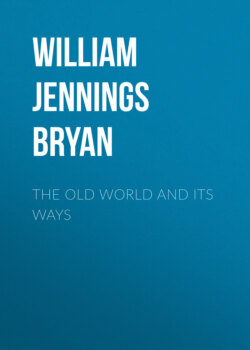Читать книгу The Old World and Its Ways - William Jennings Bryan - Страница 34
На сайте Литреса книга снята с продажи.
CHINESE EXCLUSION[2]
ОглавлениеTable of Contents
If every American could visit China, the question of Chinese immigration would soon be settled upon a permanent basis, for no one can become acquainted with the Chinese coolie without recognizing the impossibility of opening the doors of our country to him without injustice to our own laboring men, demoralization to our social ideas, injury to China's reputation among us and danger to our diplomatic relations with that country.
I made it a point to inquire among the Chinese whom I met, in order to ascertain the real sentiment back of the boycott. I had heard of students being subjected to harsh regulations at ports of entry, of travelers humiliated by confinement in uncomfortable sheds and of merchants treated rudely, and I supposed that these things had aroused the resentment. I found, however, that the things complained of were more difficult to deal with and the concessions demanded impossible to grant.
In order to understand the boycott one must know something of Chinese history. As China has never had representative government, the people have been compelled to bring their complaints before officials by petition, and where the petition has been ignored, they have been accustomed to bring such pressure to bear as was within their power, and the boycott has often been resorted to as a means of compelling action upon the part of officials. They, therefore, conceived the idea of a boycott against American goods for the double purpose of urging their own government to favorable action and of calling the attention of the American government to their complaint. Our officials are doing what they can to convince the Chinese government of the injustice and folly of the boycott, and the Chinese officials with whom I conversed seemed anxious to co-operate with our minister and consuls. Immediate action upon the part of our congress, whether favorable or unfavorable to the Chinese, will remove the excuse for a boycott and our government should not be influenced in its action by any threats affecting trade, for the subject is too grave a one to be determined by commercial considerations.
The Americans who are doing business in China are naturally anxious to cultivate friendly relations with the Chinese merchants, and just before we reached Hong Kong the American business men residing there cabled home a statement of the minimum changes in the exclusion act asked for by the Chinese merchants. I had the privilege of attending a dinner at which a number of the leading Chinese merchants of Hong Kong presented their views, and it may be worth while to give here an abstract of their demands as drawn out by cross-examination.
They desire—First, that the word laborer shall be clearly and distinctly defined, "according to the highest standard English and be limited to such class or classes of persons as originally intended to be designated by both governments."
Second, that all regulations and legislative measures affecting Chinese immigration shall be communicated to and approved by the Chinese government before going into force, and that when in force, they should not be altered without consent of the Chinese government.
Third, that American consuls stationed in China shall have full power to grant certificates of admission to persons not included in the prohibited classes, such certificates to be conclusive except in cases of actual fraud.
Fourth, that the American consul in China shall without delay issue certificates of admission to such Chinese not included in the prohibited classes as shall obtain passports from the Chinese government.
Fifth, that the Chinese government shall be permitted to appoint one European medical practitioner to act in conjunction with a medical officer appointed by the United States at the port of departure and that no one shall be rejected as diseased unless certified to be so by both medical officers.
Sixth, that Chinese once admitted into the United States shall enjoy the same rights and protection accorded to the subjects of the most favored nation, and in case of ill treatment shall be entitled to damages from the government.
Seventh, that Chinese passing through the United States en route for another country shall enjoy the same privileges as the subjects of the most favored nations.
Eighth, that Chinese residing in the United States shall not be
required to register unless such registration is required of the subjects of the most favored nation.
